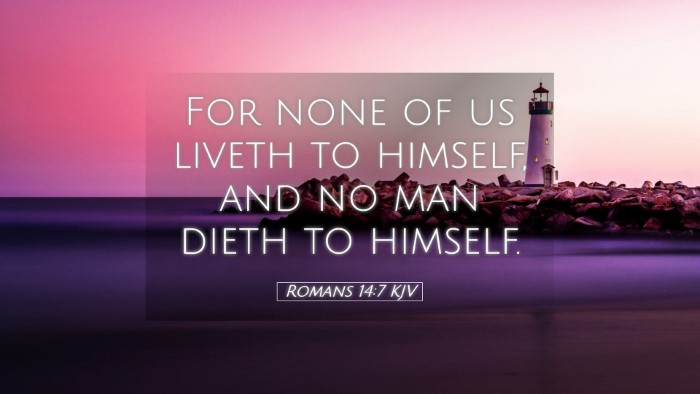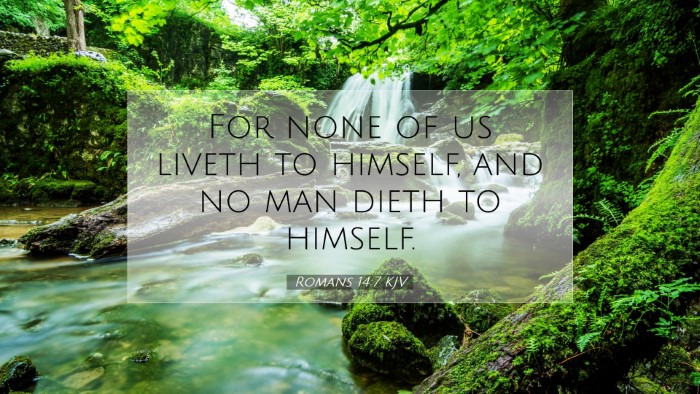Old Testament
Genesis Exodus Leviticus Numbers Deuteronomy Joshua Judges Ruth 1 Samuel 2 Samuel 1 Kings 2 Kings 1 Chronicles 2 Chronicles Ezra Nehemiah Esther Job Psalms Proverbs Ecclesiastes Song of Solomon Isaiah Jeremiah Lamentations Ezekiel Daniel Hosea Joel Amos Obadiah Jonah Micah Nahum Habakkuk Zephaniah Haggai Zechariah MalachiRomans 14:7
Romans 14:7 KJV
For none of us liveth to himself, and no man dieth to himself.
Romans 14:7 Bible Commentary
Commentary on Romans 14:7
Verse: "For none of us liveth to himself, and no man dieth to himself."
Introduction
The verse from Romans 14:7 introduces an essential principle of Christian living, emphasizing the interconnectedness of believers. The Apostle Paul, in this passage, addresses issues within the Roman church regarding moral judgment and liberty. To fully grasp the implications of this text, we examine insights from notable public domain commentators: Matthew Henry, Albert Barnes, and Adam Clarke.
Contextual Overview
Paul's directive in Romans 14 occurs within the broader discussion of the relationship between faith, individual conscience, and community. The issues at stake involve dietary practices and the observance of days, which had led to divisions. Paul emphasizes that each believer's actions should reflect consideration for others rather than selfishness.
Commentary Insights
-
Matthew Henry's Perspective
Henry notes the communal nature of Christian life, stressing that each believer is part of a larger body of Christ. His commentary highlights:
- Interdependence: “None of us lives to himself” emphasizes the duty to be mindful of how one’s actions affect others. Believers are called to live in community, fostering unity and love.
- Divine Sovereignty: In the context of life and death, Henry points out that our lives ultimately belong to God. Each person is accountable to Him, which should inform our interactions with one another.
- Mutual Responsibility: The knowledge that “no man dieth to himself” calls believers to consider the impact of their lives and deaths on the community, reinforcing a relational perspective on faith.
-
Albert Barnes' Angle
Barnes provides an exegetical approach, focusing on the implications of living for others rather than oneself. His insights include:
- Shared Existence: Barnes elaborates that this verse reflects the idea that one's life should be lived in active service to others. He believes that our daily behaviors and choices should be based on how they benefit the body of believers.
- Christ's Example: He points to the life of Christ as the ultimate model of selflessness, framing the Christian life as one of constant service to God and fellow humans.
- Accountability Before God: Barnes argues that every believer will give an account of their lives to God, which reinforces the importance of living in harmony with others.
-
Adam Clarke's Analysis
Clarke’s commentary stresses the theological ramifications of the verse, integrating a reflection on fellowship and accountability. His key points include:
- The Nature of Fellowship: Clarke emphasizes that Christian fellowship is marked by mutual support and encouragement. Our lives and choices have a ripple effect through the community.
- Life and Death in Christ: He explains that for Christians, life and death are inextricably linked to Christ. Christians must recognize the eternal ramifications of their actions, which extend beyond their personal experiences.
- Practical Application: Clarke encourages believers to assess their lives through the lens of community impact, urging consideration of how personal decisions may influence fellow believers.
Theological Reflections
This verse beckons deeper theological reflection regarding community and individual responsibility. Believers must recognize that their faith journey is not isolated but is lived out in the context of a community:
- Christlike Living: The call to live not for oneself aligns with the teachings of Jesus, who exemplified the essence of selfless love and service.
- Covenant Relationships: The relational dynamics in the body of Christ reveal that the health of the community can be greatly affected by individual behaviors and choices.
- Eschatological Accountability: Believers are reminded that their lives are part of a greater narrative that looks towards final judgment, where all will stand before God.
Conclusion
Romans 14:7 resonates deeply within the Christian call to communal living. The insights drawn from Henry, Barnes, and Clarke enrich our understanding of this verse, reminding us that we are not solitary beings but part of a larger body. As we live our lives under God’s sovereign care, may we seek to honor Him through our love and service to one another, recognizing that indeed, “none of us liveth to himself, and no man dieth to himself.”


